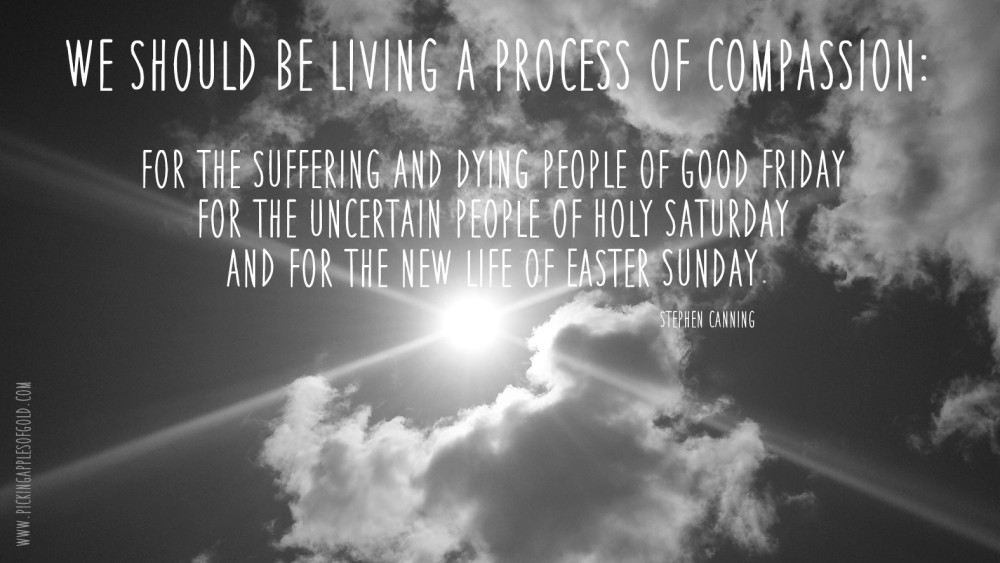So as I head off for surgery this week here is the first of the promised guest posts looking at pain and suffering. Our first post is from Stephen Canning who asks some pertinent questions about how we deal with death…
Death and Resurrection
As a nurse I have been privileged to be with patients at the end of life. Giving compassionate care to both patient and family. No amount of training can prepare you fully for such an event. The reality of loss and the feeling of failure I experienced when patients passed on almost made me turn my back on nursing. It was only on reflection that I came to understand the importance of process rather than outcome. However good my care delivery was and however much I did everything right, some patients would not get better and go home. The reality is that some people will deteriorate and ultimately die, even with the best intervention. Rather than focus on what I still see as bad outcomes, I am able to value the process of quality care delivery which gives dignity and quality of life, even at the end of life.
Does this idea of ‘process’ rather than outcome help us as Christians?
Do we feel unable to talk about death? Does our fear of upset, for ourselves and others, silence us? As a community of faith are we creating safe enough spaces for people to be liberated by having their voice heard? The alternative is to allow people to live under an oppressed silence. Are we in the business of setting captives free? Opening a dialogue about death and dying can be both difficult and damaging. Having the correct support for both those speaking and those listening is essential. This may well be the reason that we do not talk about death and dying. Will we be brave enough to come out of our comfort zones to pray, prepare and deliver safe enough spaces?
Out of our comfort zone is where the Kingdom happens.
Does the church suffer from promoting resurrection without a real understanding of death and dying? After all Jesus would not have been able to rise again without having first died. Do we keep structures and cultures alive within the church instead of allowing them to die with dignity? If so are we actively preventing new life? Are we keeping institutions alive for the sake of the institution instead of asking questions about how we bring the Kingdom to our ever changing contexts? Let’s face it, we don’t like change. Certainly not in the church. People complain of course about the slow rate of change in the church. People complain and are met with such apathy that they fall into line, grumbling.
Are we sleep walking the church to an undignified death withoutthe hope of new life?
Jesus loved the world, he had a real love for humanity – a love that transcended death, even death on a cross. As Christians, we too should be Christ’s love for humanity, the hands and feet of compassion for all people. We should be living a process of compassion for the suffering and dying people of Good Friday, for the uncertain people of Holy Saturday and for the new life of Easter Sunday.
We need also to remember the grieving and lament for the family and loved ones at a time of loss. Christianity has a language of suffering that can be useful in articulating grief. Bringing compassion into this uncomfortable time can help the grieving process. Understanding that our theologies fall down and no longer provide the answers should allow us to walk with the broken while they are angry with God.
Death is a reality of life that the church needs to explore and make safe enough spaces for people to explore. This should be done with a Christ like love for people who maybe hurting and suffering loss. A love for humanity that we hope will transcend our human inadequacies.
Bio
My name is Stephen I am 35 years old and a qualified nurse. I am married to an Anglican ordinand so am a vicars wife (husband) in training.
For previous posts on pain, see here for links.






2 Comments
ukviewer
June 11, 2015 at 1:41 pmSome hard questions about life and death. While I can’t claim the experience Stephen’s experience of death, or even the Clergy experience of death, I have walked alongside a family of someone who died a violent, unexpected death, supporting them through a whole process of repatriation, post-mortem, funeral, interment of ashes and than a memorial service.
Unless you’ve experienced it first hand, and walked that walk, over a period of six months (as it happened and follow up) it’s hard to imagine the disbelief and doubt that can overwhelm some family members. If they are unable to view their deceased relative (in this case they were unable to) it takes a huge amount to convince some of them, even when identity is confirmed via DNA & Medical evidence.
The uncontrollable grief of over 12 family members (not just one or two) you are trying to support with pastoral care, communications and the whole gamut of arrangements to get all (some from as far away as the far North) to given locations on time and in some semblance of dignity is a huge drain on you, emotionally and something that if not experienced personally, can be hard for those outside the ‘bubble’ that this becomes to understand. I can remember being criticised for taking so much time over the arrangements, visits to family and all the work involved, that I wanting to ensure that everything possible that could be done, was done, I was told point blank by my superior, that I was making a mountain out of a molehill? I asked him to come with me to meet the family and tell them that! His lack of empathy for me, let alone the family was cruel, distressing and might, if I had let it, undermined the support that I was providing for the family.
The one support among the mess that this was, the Padre who accompanied me (and the family) throughout that process. He had a dual role as a Vicar of five churches, but also a reserve forces padre. He encouraged the family to pray (they were Christians) and I believe helped them enormously, at a time, of utter despair and loss. A bye product of this, was my ‘road to Damascus moment, where I found faith in the middle of my own desperation at the situation I had been placed in, unasked, just following the requirements of my job.
I met Jesus among the chaos surrounding myself and the family, and he convinced me once and for all that he was there for them, and importantly for me. He gave me the grace, emotional strength and insight to be able to see the whole process through.
I don’t want to compare that chaos to to the state of the church today, but Stephen quite ably does and asks the questions of us all. I can’t answer his question, because I don’t have the answer he wants. I see a Church, in my place and context that is able and willing to place it’s trust in Jesus Christ, and to work within the Grace that flows from that Commitment to meet people in their context – and to bring them hope and Joy, and ultimately, in our small part of the world to witness to that promise of a new life that Jesus’ grace gives us.
My answer to Stephen is perhaps to ignore the politics which seem to pervade the media impression of Church, and be part of the solution. continue what you’re doing with your witness, as part of your christian community, encouraging others, as Barnabas (whose Saint Day is today) did. He built the Kingdom with God’s grace, in people and places, inspired by Jesus’ teaching and having known him personally and seen his works and lived among the followers who were close to him. We need to build that sort of relationship with both God and with each other and the politics will go away, as we live ‘in’ the Kingdom of God that we’re bringing about through our own activism.
Jules
June 15, 2015 at 11:48 amThanks Ernie.
You raise a key point which Stephen touches on at the beginning about our support networks. It’s so easy to be dragged into the pain/grief/emotion of those we are supporting when we need to sit with them in it, with an attitude of Christ, as you say, but then to withdraw from it ourselves. I’m glad you and someone to support you in that as often that isn’t the case.
Partly I think that’s because there isn’t the recognition of how much these things can affect both the people we deal with and our own selves. As Stephen says, perhaps we need more opportunity for people to talk about death and dying. It’s that question that I’ve seen recently on Twitter – why don’t we just use the words death, dying, died, rather than ‘passed on’ or ‘gone to sleep’. Other cultures have a far more open way of dealing with grief that allows public expression of it, rather than what often happens int he west, people stay behind closed doors. It’s like we get numbed to it, so we expect more of people, we expect that after a certain time they ‘should’ be over it it when the reality is so different.
Something for both of us to keep in our minds as we continue in ministry I think…